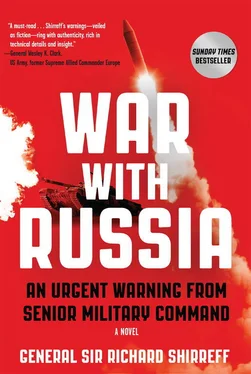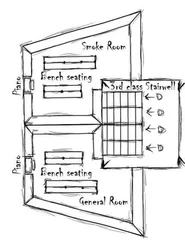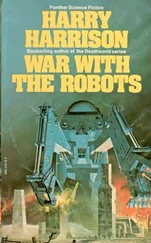The growing weakness of the West’s conventional forces means that the only way Russia can be deterred or defeated is by the threat or use of nuclear weapons. However, the consequence of the release of intercontinental ballistic missiles on Russia would be Armageddon; a result so terrible that the Russian president will calculate that the US, UK (despite the strong statement of intent from UK’s new Prime Minister Theresa May that she would have no hesitation ordering the use of nuclear weapons), and France—the only nuclear-armed states of NATO—would never risk the near total destruction of human civilization in the US and Europe for the sake of three small Baltic states.
And he is probably right. Which is why he would get away with it.
This is why maintaining an effective conventional deterrent—military forces that can fight and hold off the Russians if they attack, but above all to persuade them not to attack in the first place—is critical. It is only by having strong conventional forces that we can hope to ensure there is never a need to use that final option: nuclear weapons. Put another way, weak conventional forces make the use of nuclear weapons as a last, desperate line of defense very much more likely.
Even without the release of nuclear weapons, if we do have to fight a conventional war, prepare yourself for appalling casualties. These would be infinitely greater than anything suffered in recent wars in Iraq and Afghanistan. There could well be casualties on a Second World War level of horror. Be under no illusion whatsoever: war has a grim and uncontrollable logic of its own. Once the first bombs and missiles are launched, who can say where the next lot will end up landing? If we are hitting Russians, why should New York, Washington, London, Berlin, Paris, or Warsaw not end up being targeted in return?
It does not need Russian soldiers marching though Berlin and Paris for the world as we know it to cease to exist. A militarily victorious Russia, able to dictate to a defeated Europe and NATO from the end of a barrel as to exactly what will and what will not be acceptable to them, will be enough for life as we now know it in the West to come to a very abrupt end. NATO will collapse and transatlantic, and therefore American, security will be threatened. The President will have achieved his aim of destroying NATO, the alliance of free, democratic countries he sees as standing between him and a return to Russian great power status.
“To the victor the spoils.” Always.
As Deputy Supreme Allied Commander Europe, the DSACEUR, I sat in the council meetings with defense ministers and the decision makers of NATO; I was part of the discussions and decisions on how force should be deployed, and I walked the corridors of power in NATO HQ Brussels, the White House, No. 10 Downing Street, and the Pentagon. In this book I will take you into those corridors as the politicians agonize over whether to send in Special Forces, order air strikes, or deploy armies and navies.
I will show you, based on my personal experience of NATO’s campaigns in Afghanistan and Libya, the posturing, the vanity, the political cynicism, and the moral cowardice which all too often characterize those decisions. I will also highlight the occasional statesmanship and how the leadership and moral courage of one individual of stature can change the course of history. I know, too, the reality of combat, so I will show you how decisions taken at the highest levels affect the men and women who fight the battles and who, together with innocent civilians, pay the price of war.
When I was DSACEUR, I led exercises in which we war-gamed these scenarios, based on our own capabilities and what we knew about our enemies. What follows in this book represents one such, entirely feasible, scenario, however unimaginably awful it may seem. But just because something is unimaginably awful to Western political leaders, that does not mean it is not considered a viable option by the Russians.
This is fiction, but it is fact-based, entirely plausible, and very closely modeled on what I know, based on my position as a very senior military insider at the highest and best-informed level. Why write it as a future, fact-based fiction rather than a polemic? The answer is simple. I have contributed to at least three think tank papers, including one highly respected US think tank, in the last six months highlighting the threat from Russia. But who reads think tank papers but other think tankers? My aim has been to explain the very real danger we face to the general reader with no particular interest in defense and to make it accessible. At every stage I have shown how the political and military decisions we are currently making, and have already made, are now propelling us into a future war with Russia. However, this is a war that could yet be avoided, if we act right now.
That is why this story needs to be told before it is too late. Because, in Trotsky’s chilling words, “You may not be interested in war, but war is interested in you.”
Of one thing I am absolutely certain: the President in the Kremlin knows all this and, even as you read these words, his admirals and generals are also war-gaming these very scenarios. And they have every intention of winning the war.
General Sir Richard Shirreff Laverstoke, Hampshire August 2016
IT IS MAY 2017.
A new US president was inaugurated in January and immediately reversed President Obama’s “hands-off” approach to Russia. The first new foreign policy decision was to arm Ukraine with the counter-battery radars, drones, electronic warfare equipment and secure communications, armoured HUMVEEs, and medical equipment it so desperately needed if it was to defend itself against the Russian separatists, supported by Russian regular forces. But equipment is rarely enough and, on the advice of the generals, US military personnel were also deployed to train the Ukrainian army in how to operate this highly sophisticated equipment.
This allows the President to tell the world that the US is in Ukraine only in the role of “trainers” and not as combatants; an obfuscation that the American president believes will deter the Russians and their proxies without over-inflaming existing tensions.
However, the absence of US soldiers on the ground to protect the trainers leaves them vulnerable to attack. The compromise solution is to provide US fighter air cover, although the generals warn that there is little a fighter aircraft, however sophisticated, can do to protect a few men on the ground from 20,000 feet. Only too aware that the American people in general, and the House of Representatives and the Senate in particular, will not countenance US “fighting” soldiers stationed in Ukraine, the President tells the generals to stop complaining and make it work. Anyway, the 2014 Minsk peace accord is still holding and not even the most hawkish US general is suggesting that Russia is about to attack.
The equipment and the trainers are sent, their mission specific: get the equipment installed and working, get the Ukrainians trained and then get out as quickly as possible.
In the UK, the new Prime Minister is distracted by the consequences of the UK electorate’s vote to leave the EU in the June 2016 referendum. In an attempt to enhance their “special relationship” with the United States, the UK timidly sent a small team of medics and supply officers to help train the Ukrainian army in 2015. However, far from sending a signal of strength and resolution, these efforts appear weak and the force a potential hostage to fortune. Just as bad, this move reinforces the Russian narrative of NATO trainers being Ukraine’s “foreign legion,” an insult that plays particularly well with nationalist forces at home.
Читать дальше












